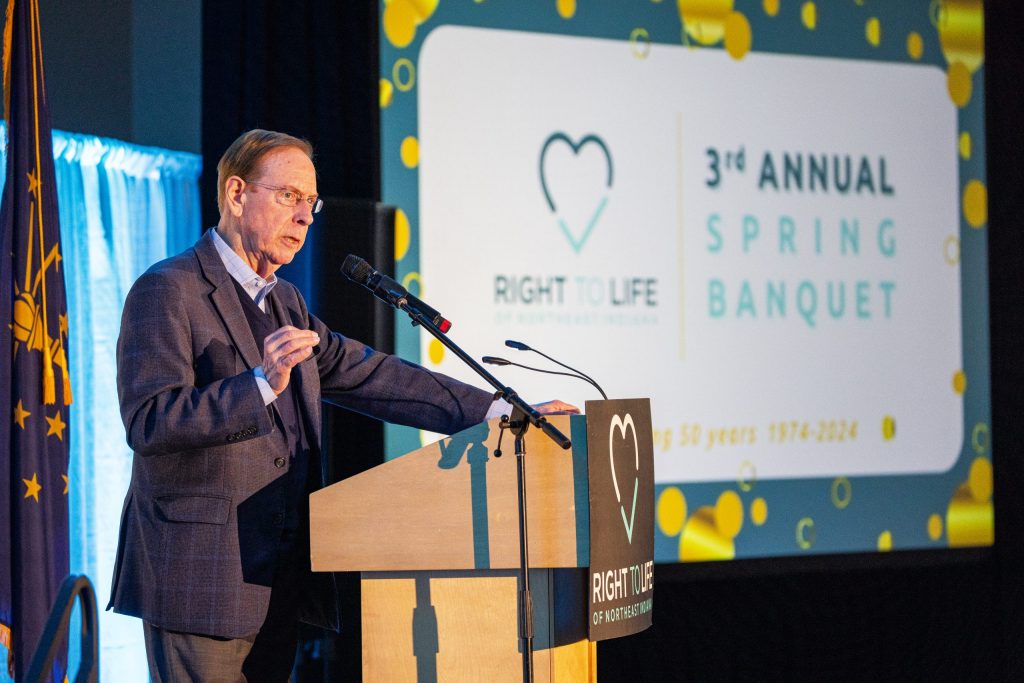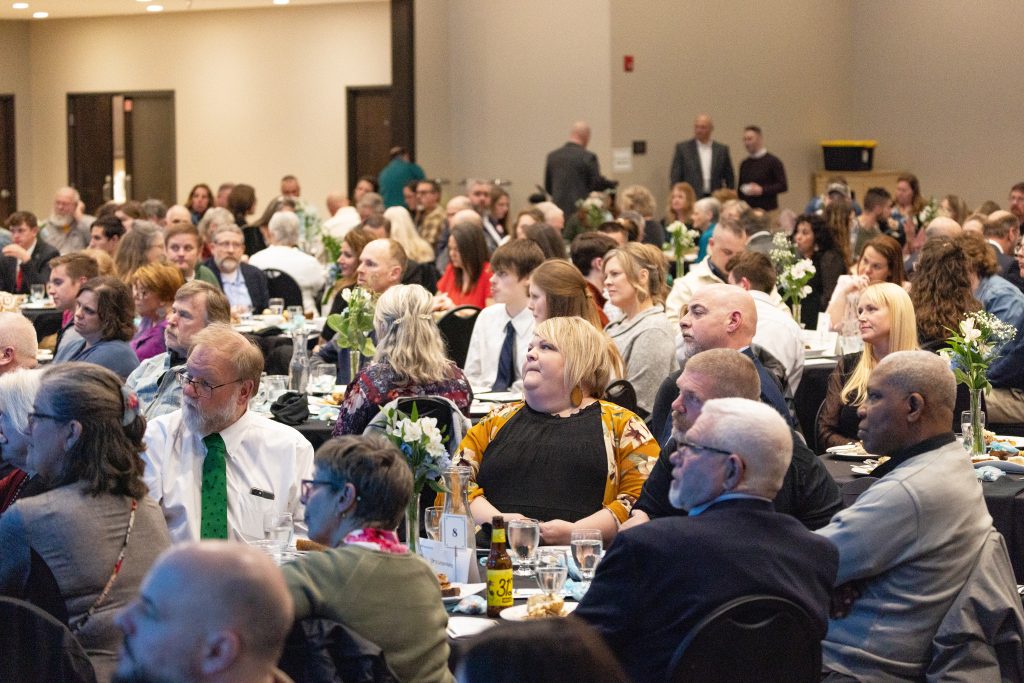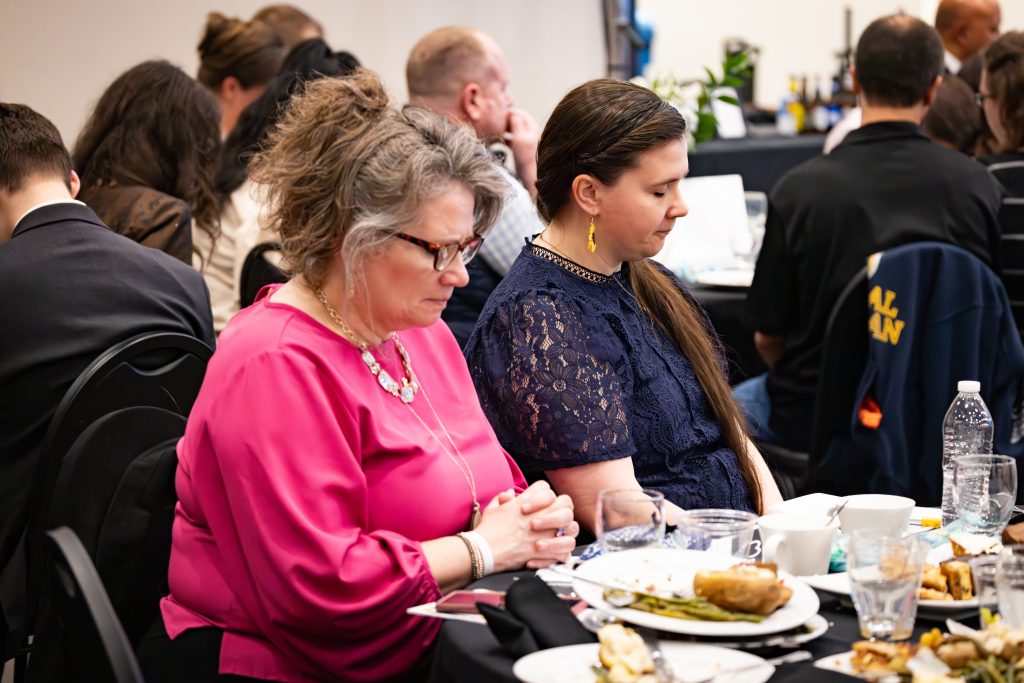March 22, 2024 // Diocese
‘5 Love Languages’ Author Advocates to Stand Up for Life
Hundreds of pro-life supporters gathered at the Steuben County Event Center in Angola on Saturday, March 16, for Right to Life of Northeast Indiana’s Third Annual Spring Banquet. After members of the Knights of Columbus presented the flags and Pastor Joshua Hawkins from Fremont Community Church gave the opening prayer, the crowd spent the bulk of the evening listening to an engaging exhortation on the reason those involved in the right to life movement take up this critical work: love.
The leadership team at Right to Life of Northeast Indiana invited Dr. Gary Chapman, a best-selling author and speaker, to give the evening’s keynote address. Chapman is best known for his book, “The 5 Love Languages: The Secret to Love That Lasts,” which has sold more than 20 million copies since it was first published in 1992. The book proposes that each of us has one or more of five specific ways in which we want our partners to show us their love. The “5 Love Languages” are acts of service, words of affirmation, quality time, gifts, and physical touch. The success of “The 5 Love Languages” prompted Chapman, a Baptist pastor and marriage counselor from North Carolina, to write several spin-off books aimed at parents, singles, men, and more.

Photos by Scott Warden
Dr. Gary Chapman speaks to the crowd during his keynote address at Right to Life of Northeast Indiana’s Third Annual Spring Banquet, which was held on Saturday, March 16, at the Steuben County Event Center in Angola.
In his opening remarks, Chapman acknowledged that the word “love” is both “the most important word in the English language and the most confusing word in the English language.” It is the most important, he said, because, above all, it is at the heart of the Great Commandment, directed by Christ Himself. It is by love, Chapman said, that God gave “the non-Christian world the right to judge whether or not we’re true Christians.” It is the most confusing word, he added, because we use it in a thousand different ways. “We say, for example, ‘I love hot dogs.’ Or in North Carolina, where I live, we say, ‘I love barbecue.’ … And then I hear people say, ‘Oh, I love the mountains. I love the beach. I love my new car. I love my dog.’ And then we say to a special someone, ‘I love you.’ What is that supposed to mean? I’d love some barbecue with you?” he said as the crowd laughed.
Chapman, however, spent the majority of his 35-minute keynote address on love as a character trait – something, he said, those who work in and support the right-to-life movement have in spades. Character, he said, “is who we really are. And there are people for whom love is a character trait – that is, they have the attitude of love every single day.” Chapman went on to list what he called the “seven traits of love”: kindness, patience, forgiveness, courtesy, humility, generosity, and honesty. These traits, he said, “have perfect application to the ministry of Right to Life of Northeast Indiana.”

Attendees listen intently to the keynote address during the Right to Life of Northeast Indiana’s Spring Banquet.
Kindness, he said, is “what the whole organization is about. It’s words and deeds, trying to help other people – in this case, it’s trying to help those who are still in the womb. In the clinics and the associations where so many of the ladies come for counseling and help, you’ve never met anybody more kind than the people that work in these places.”
One of the more unheralded traits, Chapman said – and one that most relates to the work of the right-to-life movement – is humility. “Humility is stepping down so others can step up,” Chapman said. “People that work for Right to Life and all the people with whom they participate, those people working those clinics, they’re down in the trenches … stepping down where people are hurting and struggling. … Let this attitude be in you. Loving people are characterized by humility.”
He highlighted the trait of honesty next, saying honesty is “sharing the truth in love. This is what we’re trying to do in the ministry of Right to Life – sharing the truth about life … with an attitude of love. We care about people.”
Throughout his speech, Chapman was quick to point out that our love of human life should extend to all lives, regardless of age, health, or circumstance. That belief, he said, “Begins in Genesis Chapter 1,” when God created man in His own likeness. “And then we read these words: ‘God saw all that He had made, and He said, ‘It is very good.’ This is why we believe in the sanctity of life, because we are not simply an animal that came through evolution, we are a creature made in the image of God. … You would not be here tonight if you did not believe that life matters. But in today’s world, where divine revelation has been largely denied or ignored, it’s easy to slip into the mindset of human reason. And that’s where we are largely in our country today. You see, it’s human reason that says to some people, ‘But if that life is mentally or physically abnormal, would it not be better to end that life? Or if that life is old and no longer capable of walking and talking and doing things, wouldn’t it be better to end that life?’”
To illustrate his point, Chapman told the audience that some time ago he visited the Holocaust Museum in Israel – a powerful and forming experience. He quoted Leo Alexander, the late psychiatrist and neurologist who was largely responsible for writing the Nuremburg Code, which drew the lines on what was and was not ethical or moral regarding human scientific testing after the atrocities in Nazi Germany. According to Chapman, Alexander said: “It all started with the acceptance of the attitude that there is such a thing as a life not worthy to be lived. And once that belief was accepted, it was only a matter of deciding which lives are not worthy of living.”
Chapman added, pointedly: “You see, if all begins with the idea that there is such a thing as a life not worth living, when society adopts that belief, there’s no limit to where it will end. And it’s tragic that it is so widespread in our country. We’re here tonight because we do not accept that belief. We believe that all life is sacred – life in the womb and life in the nursing home.”
To conclude his speech, Chapman urged those in attendance to continue advocating for the dignity of all human life. “God’s grace calls us to seek to protect the unborn child, and every way we can to help that mother who chooses to have that child. But God’s grace also calls us to seek to redeem the woman who saddens our hearts because she made the wrong choice. I know that Right to Life has been around now for 50 years, and there is a chance that when you’ve worked to save life for all these years, and you still see the number of abortions that are happening in this country, there is a sense in which we can be tempted to give up. And let me remind you that the slavery movement in this country did not end quickly. … But there were those who stayed with the journey, who stayed to the end until it was finally abolished. America took even longer to abolish that atrocity in our country. So let us not give up, even though we’ve been on this journey for 50 years. Let us not give up in standing for what is right.”
The best news. Delivered to your inbox.
Subscribe to our mailing list today.







